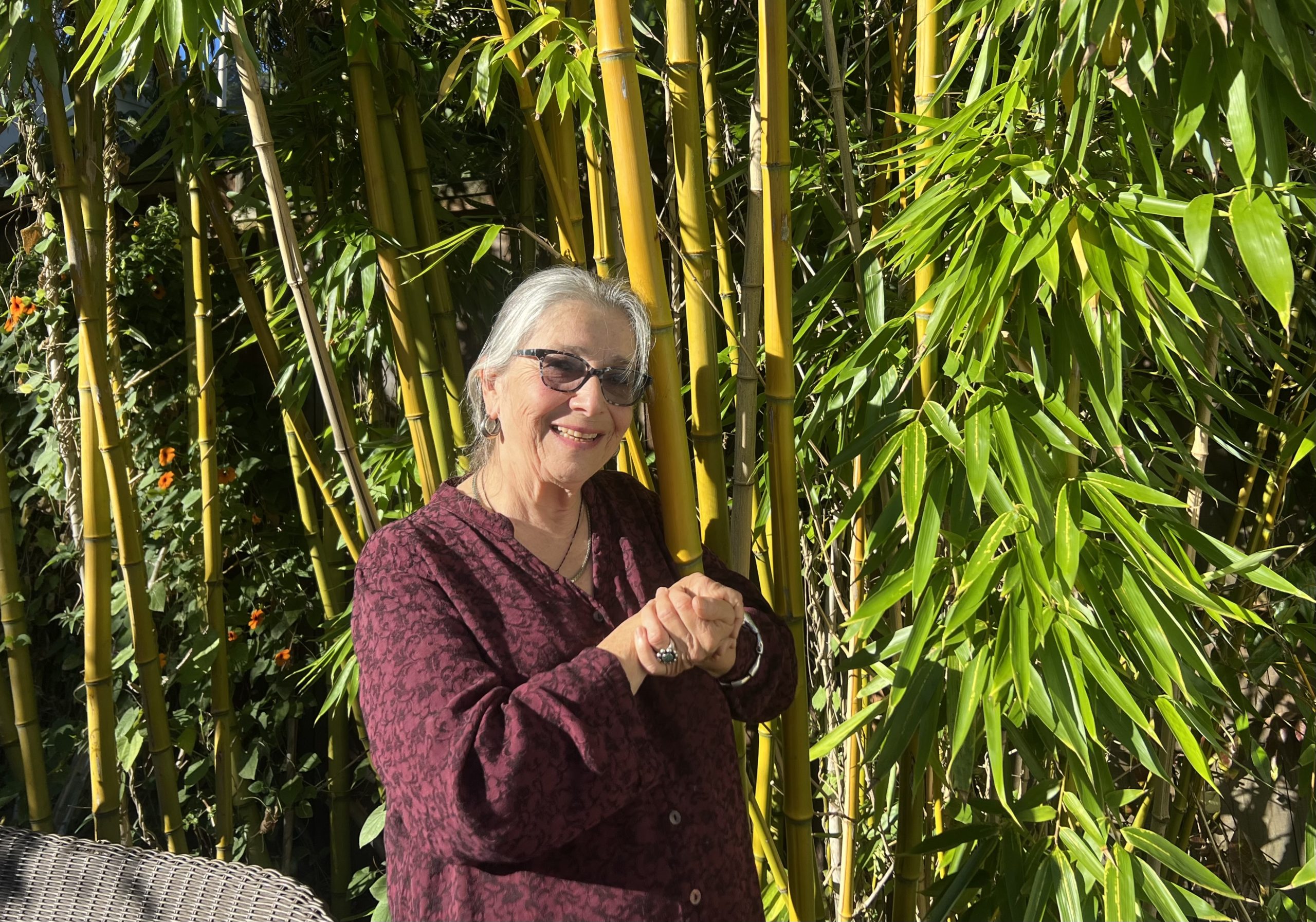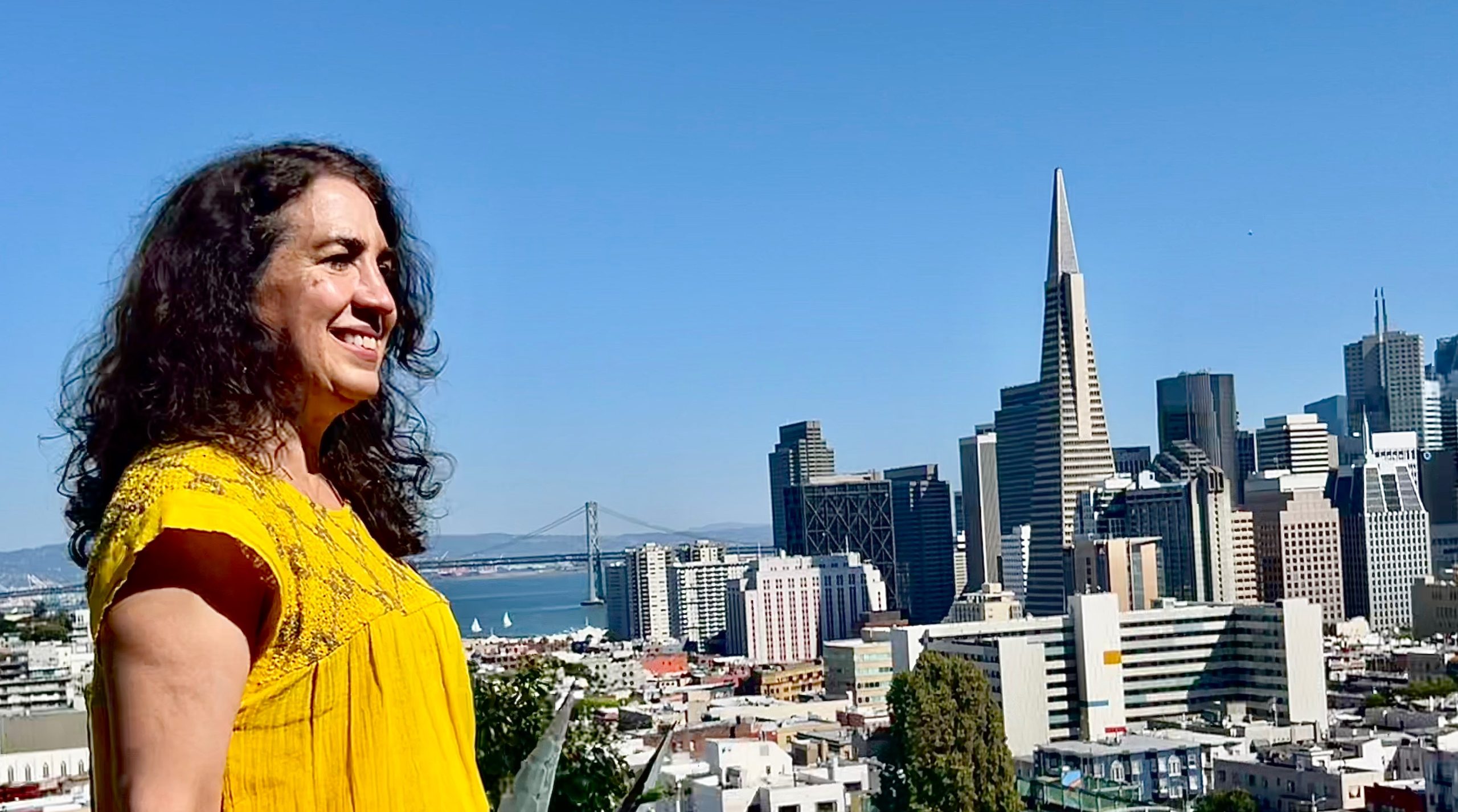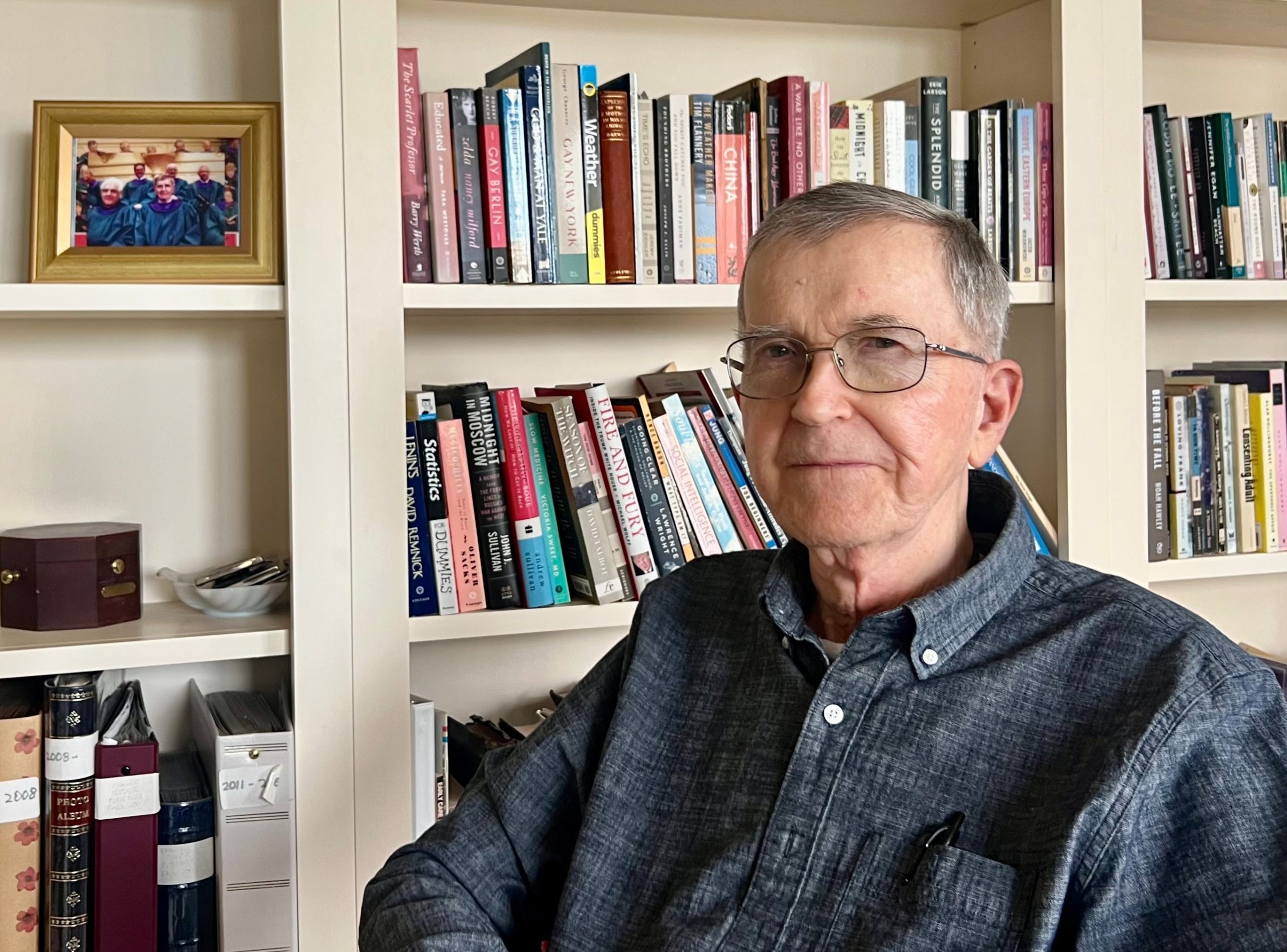Fighting for social justice never gets old: Longtime Greenpeace campaigner & Agape leader opens new door to activism
Despite a lifelong fear of heights, Karen Topakian at the age of 63 climbed up on a gigantic metal crane behind the White House five days after Donald Trump took office. She and six other Greenpeace activists unfurled a huge banner that said, “RESIST.”
To prepare for the action and overcome her fear, she practiced climbing ladders. “At every point in your life, there’s a way to make a difference,” she said. “We took this action to give people hope, to show everyone they’re not alone in their resistance.”
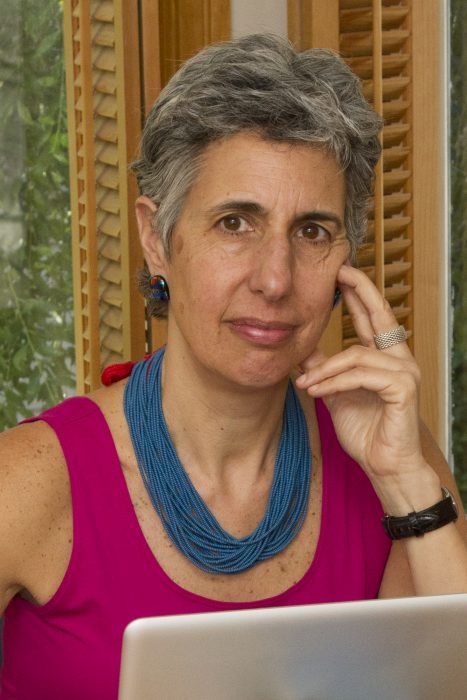
That was in 2017. But Topakian had worked for Greenpeace shortly after college. It was the first of many jobs for social justice nonprofits she would have before starting her own business providing communications support to such organizations. Which is what Topakian, now 67, does today. Current clients are Scrutineers, a non-partisan election and voter protection organization, and Immigrants Rising, which helps undocumented young people achieve educational and career goals.
You could say Topakian’s bent for social justice was in her genes. Her ancestors are Armenian, whose Christian populations in Islamic Turkey faced oppression and even pogroms over the years. “Both my grandfathers fled Turkey when they realized that government was going to conscript Christians,” she said. “They believed they would have to kill their own people.”
It emerged in high school, when she threatened to shave her head in opposition to the war in Vietnam. “The vice-principal called me into his office, hell-bent against me doing it,” she said. “I didn’t fight back; I hadn’t organized any support.”
That would eventually change.
At Greenpeace in San Francisco, Topakian organized demonstrations, non-violent direct actions, and helped create press releases about the dangers of naval nuclear weapons. Later, she was executive director of The Agape Foundation Fund for Nonviolent Social Change, which helped launch groups that would become household names, like Amnesty International and The Farmworkers Union.
Pollution, assassination, social upheaval
High school for Topakian was lived in the 1970s amid a cultural upheaval that spawned a number of historic social justice movements. She was hearing about the assassination of Dr. King from her Congregational Church minister, who had marched with him. The pollution she saw on a canoe trip down Rhode Island’s Pawtuxet River with her economics and politics class “horrified” her.
“It was the combination of seeing the pollution, hearing about the assassination of Dr. King, discussions with my parents, and the times of social upheaval I was living in that convinced me that I wanted to devote my life to social justice.”
Topakian was born in Cranston, R.I. Her mother worked as a kindergarten teacher before raising a family and later worked in retail. Her father was president of the family’s costume jewelry electroplating business in Providence. Armen Topakian and his brother were the third-generation owners, along with their mother. All family members worked at General Plating Company at some point in time,” said Topakian. “It was my introduction to the labor market.”
When it came time for college, Topakian chose Clark University in Worcester, Mass., because she wanted a “good liberal arts education.” And, Abbie Hoffman had grown up in Worcester, so she thought that was probably a good place to be.
“I decided to study social movements, how they got started and why people gravitated to them in the early ’70s,” said Topakian, who majored in sociology, minored in theater. One of her professors, with whom she is still friendly, was Dr. Robert J. Ross, one of the founders of Students for a Democratic Society, many of whose parents had participated in progressive social movements in the 1930s.
Reconstructive elbow surgery necessitated a move back to her parents’ home for recovery. But not for long. A cousin was starting a communal house in Newport. “I moved in and stayed for nine years,” she said.
Anti-nuclear fights
While in Rhode Island, she studied filmmaking, directed the local food cooperative and was the first director of the state university’s Women’s Center. She also organized and participated in civil disobedience opposing nuclear weapons and the military industrial complex. There was the twice-a-month vigil at a company that built nuclear-powered and weaponed submarines, followed by protests at sub launchings in Connecticut. She and five fellow activists faced disorderly conduct charges in 1982 for her participation in a Trident submarine protest.
“With the help of my girlfriend at the time, who was a public defender, and other lawyer friends, we defended ourselves, including selecting and questioning the jury, and questioning and cross-examining witnesses,” she said. Arguing the prosecutor failed to prove his case, Topakian motioned for acquittal, which was granted.
The next year she was among a group charged with obstructing a street and disorderly conduct for taking part in a rally opposing the use of tax dollars to finance nuclear war. They defended themselves again, but this time were found guilty. Topakian got probation and community service.

“I asked the judge if I could do my community service in San Francisco because I was moving there to attend graduate school, and he agreed,” she said. She completed 20 hours of service at the San Francisco Women’s Building, the first woman-owned and operated community center in the country, while studying filmmaking at the San Francisco Art Institute. She completed her Master of Fine Arts degree in 1987.
An experienced social justice organizer, Topakian was also melding into the local activist community. Rainforest Action Network founder Randy Hayes connected her with other environmentalists in the Bay Area. He also tipped her off to a job at Greenpeace, which she joined in 1986 as a nuclear disarmament campaigner. “It was close to my heart,” she said. “My job was to help rid the world of naval nuclear weapons.”
Aiding activists around the world
Tasked with overseeing activity in the Pacific corridor, she traveled to Micronesia, Japan, Australia and New Zealand. She also sailed from San Francisco to San Diego on the Rainbow Warrior III, the third of Greenpeace’s motor-assisted sailing yachts. “Stopping in ports and giving tours and lectures to people who came on board was an exceptional experience,” she said.
Topakian had been with Greenpeace for five years when she was laid off during budget cuts. She found communications work at the California Nurses Association, but an invitation to join the Agape Foundation board would lead to her next social justice job. In 1993, Agape’s executive director decided to leave. She applied and got his job. The foundation was established in 1969 in Palo Alto to finance anti-war and social justice organizations. Some of them would become household names like Amnesty International and The Farmworkers Union.
Under Topakian, Agape funded the Western States Legal Foundation, which monitors and analyzes U.S. nuclear weapons programs and policies; and the Insight Garden Project, vocational gardening and landscaping training “so that people in prison could connect to their communities and themselves,” she said, adding that it became a model for many prisons throughout the country.
Topakian ran the Agape Foundation until 2009, when she decided to “use my executive director skills and start my own business.” Topakian Communications fills all the roles she’s mastered throughout her career: writer, communication consultant, meeting facilitator, public speaker and social activist.
Time to kick back – just a little
It also affords her more time with her partner of 30 years, Peg Stevenson, for swimming at The Embarcadero YMCA, dance classes at ODC, and three book groups – not to mention she’s writing a novel based in her home state of Rhode Island.
But Greenpeace was never out of her life for long. Two years after becoming head of the Agape Foundation, she joined the Greenpeace board. She exits at the end of this year, after 26 years’ membership, 10 of them as chair.
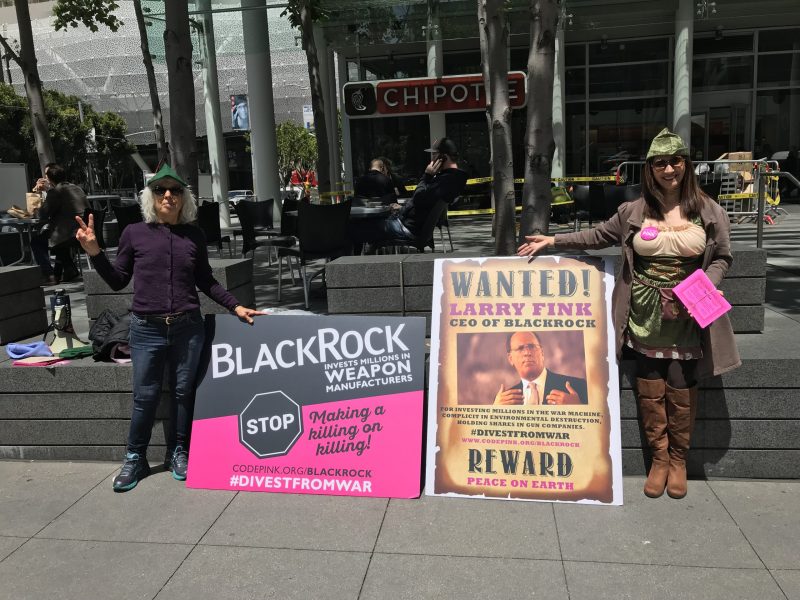
And she hasn’t stopped her public protests. In May, she took part in a nationwide protest of Black Rock, which supports coal production and fossil fuel companies. The San Francisco action took place in front of the investment management Howard Street offices.


